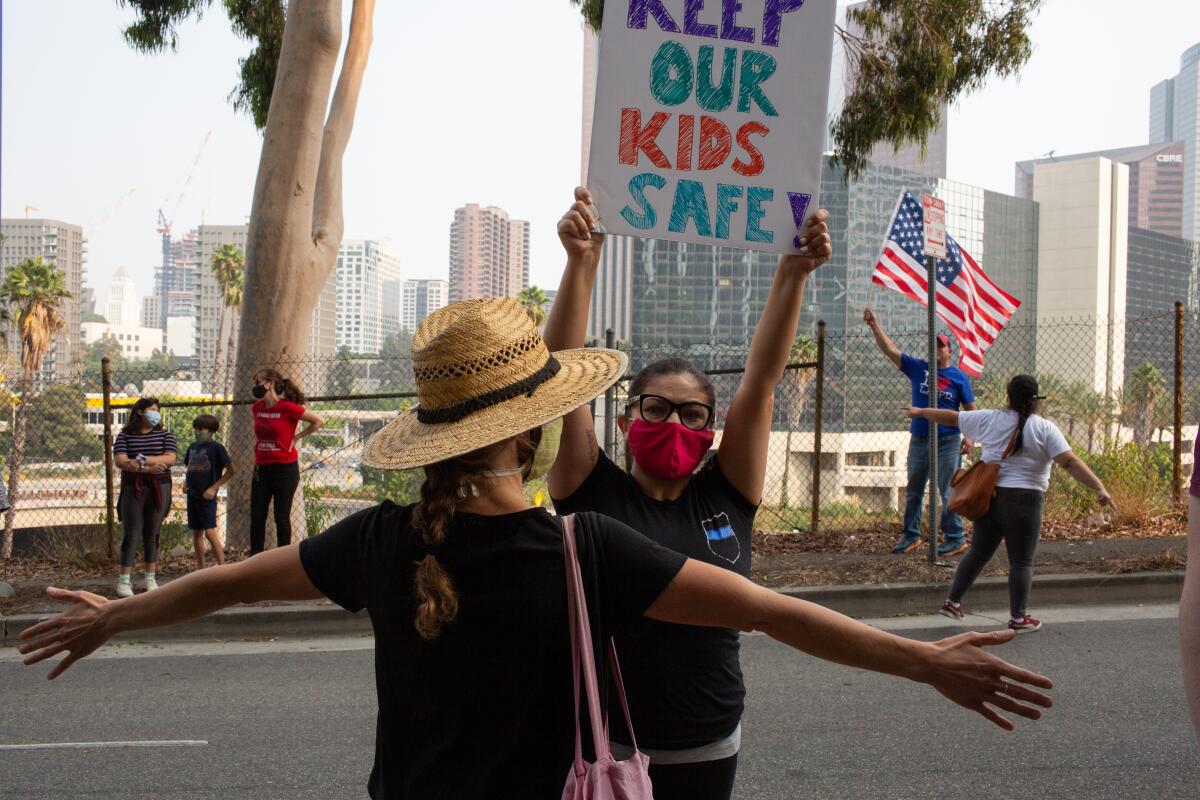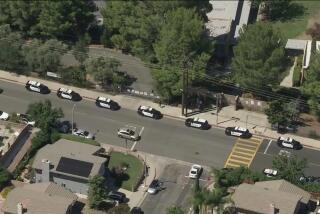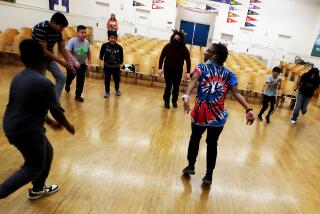A dramatically diminished L.A. school police force under proposed cuts

Two months after a divided Los Angeles Unified school board slashed funding for its police department by more than a third, the contours of a dramatically diminished force emerged this week.
Under a plan presented to the board on Tuesday, police officers would be removed from school campuses and weekend patrols meant to protect schools from vandalism would be eliminated, among other cuts.
The debate over the proposed cuts, set for later this month, marks a wide split on the board over the role that armed, uniformed officers should play in providing security to hundreds of thousands of students enrolled at more than 900 campuses.
With some on the seven-member board calling for the complete elimination of the police department and others opposed to cuts, the sharply opposing views played out in the streets outside the district’s downtown headquarters this week, where protesters in favor of police reforms sparred verbally with police supporters.
And in a signal of how unresolved the issue remains for many, a district task force said it intends to survey high school students, parents and employees around the district to evaluate opinions on school police.
Embedded in the proposal to cut spending is a recent district effort to rein in the widespread use of overtime in the police department. The practice has resulted in mid-level supervisors, detectives and rank-and-file officers taking home some of the the highest pay in the nation’s second-largest school system, with about two dozen officers earning at least $190,000 last year.
The board first took up the idea of overhauling its police force this summer amid national protests over killings of Black people by police officers. Confronted with impassioned demands that they move decisively to rethink policing at schools, board members decided in a 4-3 vote on June 30 to cut $25 million from the police department’s $70-million budget — a 36% reduction. The decision was largely viewed as a preliminary step by the board majority toward shutting down the department entirely.
But the decision was made without any advance planning on how to carry out such a large funding cut. The district’s eight-member Reimagining School Safety Task Force was left to come up with a proposal.
The biggest proposed cut, nearly $6.3 million, would entirely eliminate weekend and overnight patrol services that are set up to protect school property and respond to calls at or near schools. The district would instead have to rely on responses from Los Angeles police, the L.A. County Sheriff’s Department and other police agencies that serve cities other than L.A. that are within the massive school system.
Complicating the task is that the school board resolution that called for a cut to police funding precludes the district from paying for service from other police forces or armed private security.
The second-largest reduction, close to $5.9 million, would remove all officers from campus-based assignments. Instead, they would shift to a plan under which officers would patrol areas around schools and come on campuses when summoned. Currently, high schools typically are assigned one officer, while two middle schools frequently share an officer.
Some cuts would affect ongoing efforts to improve interactions between students and police, in which officers serve as mentors and participate in school activities. The task force also suggested cuts to extra, non-mandated training that officers receive on the proper use of force and overcoming unconscious bias.
Some of the cuts did not seem to sit well with board members who saw them as too focused on simply taking services away rather than on rethinking how to make schools safe.
“I do want to just put on the table… before we think about cuts, I hope that we can also spend time on the role — the choices between defining the role of a police force,” Monica Garcia said at the meeting Tuesday. She supports gradually eliminating the department entirely.
George McKenna, the board’s lone Black member, said he strongly supports efforts to end police brutality but believes school police are being unfairly maligned.
“The school police were never a danger to the students,” McKenna said. “Are you under the assumption that there are no Crips, no Bloods, [that] there are no gangs out there and we’re going to do this with social workers?”
He added: “I’ll invite you to the first funeral that we have to have of a child [because] we don’t have anyone protecting them on that campus.”
The board action also called for officers to give up their uniforms and patrol off campus. A $25-million cut is expected initially to lead to the layoffs of 65 officers in the 471-employee department.
Twenty officers have resigned since the cuts were approved, concerned about the “stability” of the department, interim Chief Leslie Ramirez said. Her predecessor, Todd Chamberlain, resigned as chief the day after the board approved the cuts.
Money saved from the cuts is to serve the needs of Black students, who make up about 8% of students and who have a disproportionately high number of interactions with officers.
Joseph Williams, director of operations and campaigns with the group Students Deserve, said the survey the district plans to conduct should give weight to the view of Black students, who have endured an outsize burden from over-policing. His group, in which students set the policy, and others have complained about a lack of access to the district task force and its efforts to date.
“The lack of community engagement...sends a message: that the Black, Indigenous and People of Color (BIPOC) communities that LAUSD serves are being shut out of a process that directly impacts us,” a coalition of groups wrote in an early August letter to district officials.
Outside the building Tuesday, about 250 demonstrators called for eliminating the school police department, transferring its budget to counseling and other vital student services.
“We still haven’t gotten the full, defunding of school police, which is what we want,” said Sarah Djato, a senior at Dorsey High in southwest Los Angeles. “When we talk about reimagination, it looks like fully funding counselors. It looks like fully funding psychiatric social workers. It looks like having no cops on campus.” And it means supporting teachers, she said, “who actually care and want to provide for students and do not criminalize us and instead encourage us to do better each and every day.”
The demonstrators commandeered the block of South Beaudry Street at the entrance to school district headquarters for songs, chants and testimonials. They drew in chalk on the sidewalk: “Libraries not jails.” “Arrested development.”
“Hands off our kids,” read one sign. “End the police.”
About 20 minutes into the rally, about 30 counter-protesters rounded the corner. Many were off-duty officers from the L.A. school police and other departments. A few spoke about the weekend shooting in Compton of two sheriff’s deputies. Among them was an off-duty officer who tried to drown out the anti-police rally by revving his customized Road King motorcycle.
His bike was loud, but the anti-police demonstrators had formidable loudspeakers and formed a protective ring that kept the pro-police demonstrators from getting close.
“The gloves are off,” the officer explained about his noise-making. “Enough is enough. Everything that they’re about, we understand. Nobody hates bad cops more than good cops because it’s a reflection on us.”
The man wore a dark-tinted helmet and a tank-top bearing a portrait of former President George W. Bush. He declined to say his name or name his department but said his wife is a district teacher and that he has school-aged children.
“We’re tired,” he said. “We’re defeated. There’s good cops leaving the profession. And the people that are going to suffer the most are the law-abiding citizens and the victims. We want to keep the schools safe. We want to keep our kids safe.”
More to Read
Sign up for Essential California
The most important California stories and recommendations in your inbox every morning.
You may occasionally receive promotional content from the Los Angeles Times.











